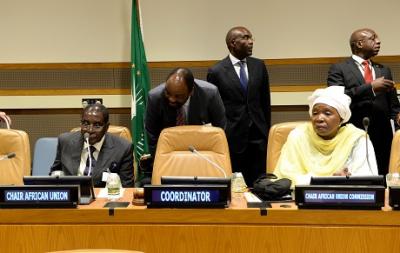
By Usman Inuwa
Region-wide disappointment and criticism have greeted the inability of African leaders to showcase their commitment to combating the challenges of climate change on the continent as many of them failed to attend the preparatory climate meeting organised for African Heads of states at the sidelines of the 70th UN General Assembly taking place in New York.
Organised under the auspices of the Committee of African Heads of State and Government on Climate Change (CAHOSCC), the meeting aspired to provide an opportunity for African Heads of states and Government to meet, get updated, exchange views and analysis on the continent’s effort to consolidate itself on the ongoing international dialogue process for a suitable climate change agreement, which will be reached in Paris in December 2015.
The New York meeting also provided a strategic opportunity for the convergence of African leaders attending the 2015 UNGA meeting to discuss and agree on a position that will secure a promising and climate-resilient future for all Africans subsisting under debilitating conditions of changing climate and food insecurity.
In a statement released today in New York by the coalition of African civil society organisations under the aegis of Pan African Climate Justice Alliance (PACJA), Africans expressed their disappointment over the absence of several CAHOSCC members at the meeting convened by its Coordinator, HE Fattah El Sisi, the President of the Arab Republic of Egypt, and attended by Chairperson of the African Union (AU) HE Robert Mugabe.
According to Mithika Mwenda of PACJA, “CAHOSCC remains a veritable platform for African leaders conceived to provide the highest political leadership possible on climate change in Africa and its relevance must not be mistaken with that of the Ministers who have their platform where they compile the African position on issues of urgent climate concern, under the guidance of the African Group of Negotiators.”
“As civil society, we are on top of the developments in Africa and as climate change negotiations unfold, we hope that our leaders will not fall into the trap of 2009, when they gave into a wholly unacceptable outcome. This can only happen if they are available to listen and widely consult with other stakeholders across the continent,” Mithika added.
Re-echoing the views expressed at the meeting by the African Union Commission (AUC) Chairperson, HE Dr. Nkosazana Dlamini Zuma that Africa should be left to develop its own initiatives to enhance the climate resilience of our people while contributing to the global effort to defeat the challenges of climate change, the African civil society alliance commended the leadership of the AUC Chairperson for “the stewardship she has provided in positioning climate change as the top-most priority for the Commission” and at the same time bemoaned the attitude of some African Heads of State who continue to bypass this crucial opportunity to join forces with CAHOSCC in demonstrating their commitment to navigating this critical issue.
The civil society actors from across Africa urged their governments to build on the existing initiatives and avoid the emerging trend where the African continent is turning out to be the experimental ground for climate change solutions developed elsewhere. “We want to see our Governments’ firm commitment to a strong unified African position during COP21, on the Initiative on enhancing support to Africa on Adaptation and Loss and Damage, and the African Renewable Energy Initiative” the statement emphasised.
Insisting that energy access and adaptation were the most pressing issues in Africa’s response to the climate crisis, PACJA expressed its confidence in Africa’s strong networks, institutions and the sufficient capacity to deal with any area of climate response including adaptation, mitigation, technology transfer or finance.
The further called on their governments and development partners to support the work of the Climate and Development for Africa Programme (CLIMDEV Africa) to enhance its capacity rather than duplicating the work its already doing under African Climate Policy Centre (ACPC), Africa Climate Change Fund (ACCF).
CLIMDEV Africa, in partnership with African Union Commission, African Development Bank (AfBD) and the United Nations Economic Commission for Africa (UNECA) have come together in an unprecedented relationship that provides policy and programmatic guidance on continent-wide outreach, bringing together governments, UN Agencies, Regional Economic Integration Communities, the Private Sector, and Civil Society among others.










